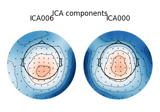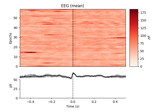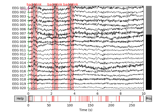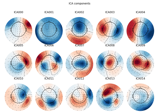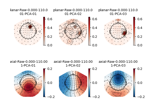mne.preprocessing.create_ecg_epochs¶
-
mne.preprocessing.create_ecg_epochs(raw, ch_name=None, event_id=999, picks=None, tmin=- 0.5, tmax=0.5, l_freq=8, h_freq=16, reject=None, flat=None, baseline=None, preload=True, keep_ecg=False, reject_by_annotation=True, decim=1, verbose=None)[source]¶ Conveniently generate epochs around ECG artifact events.
- Parameters
- rawinstance of
Raw The raw data.
- ch_name
None|str The name of the channel to use for ECG peak detection. If None (default), ECG channel is used if present. If None and no ECG channel is present, a synthetic ECG channel is created from cross channel average. Synthetic channel can only be created from MEG channels.
- event_id
int The index to assign to found events.
- picks
str|list|slice|None Channels to include. Slices and lists of integers will be interpreted as channel indices. In lists, channel type strings (e.g.,
['meg', 'eeg']) will pick channels of those types, channel name strings (e.g.,['MEG0111', 'MEG2623']will pick the given channels. Can also be the string values “all” to pick all channels, or “data” to pick data channels. None (default) will pick all channels.- tmin
float Start time before event.
- tmax
float End time after event.
- l_freq
float Low pass frequency to apply to the ECG channel while finding events.
- h_freq
float High pass frequency to apply to the ECG channel while finding events.
- reject
dict|None Rejection parameters based on peak-to-peak amplitude. Valid keys are ‘grad’ | ‘mag’ | ‘eeg’ | ‘eog’ | ‘ecg’. If reject is None then no rejection is done. Example:
reject = dict(grad=4000e-13, # T / m (gradiometers) mag=4e-12, # T (magnetometers) eeg=40e-6, # V (EEG channels) eog=250e-6 # V (EOG channels) )
- flat
dict|None Rejection parameters based on flatness of signal. Valid keys are ‘grad’ | ‘mag’ | ‘eeg’ | ‘eog’ | ‘ecg’, and values are floats that set the minimum acceptable peak-to-peak amplitude. If flat is None then no rejection is done.
- baseline
tuple|listof length 2 |None The time interval to apply rescaling / baseline correction. If None do not apply it. If baseline is (a, b) the interval is between “a (s)” and “b (s)”. If a is None the beginning of the data is used and if b is None then b is set to the end of the interval. If baseline is equal to (None, None) all the time interval is used. If None, no correction is applied.
- preloadbool
Preload epochs or not (default True). Must be True if keep_ecg is True.
- keep_ecgbool
When ECG is synthetically created (after picking), should it be added to the epochs? Must be False when synthetic channel is not used. Defaults to False.
- reject_by_annotationbool
Whether to reject based on annotations. If
True(default), epochs overlapping with segments whose description begins with'bad'are rejected. IfFalse, no rejection based on annotations is performed.New in version 0.14.0.
- decim
int Factor by which to subsample the data.
Warning
Low-pass filtering is not performed, this simply selects every Nth sample (where N is the value passed to
decim), i.e., it compresses the signal (see Notes). If the data are not properly filtered, aliasing artifacts may occur.New in version 0.21.0.
- verbosebool,
str,int, orNone If not None, override default verbose level (see
mne.verbose()and Logging documentation for more). If used, it should be passed as a keyword-argument only.
- rawinstance of
- Returns
- ecg_epochsinstance of
Epochs Data epoched around ECG r-peaks.
- ecg_epochsinstance of
See also
Notes
Filtering is only applied to the ECG channel while finding events. The resulting
ecg_epochswill have no filtering applied (i.e., have the same filter properties as the inputrawinstance).
